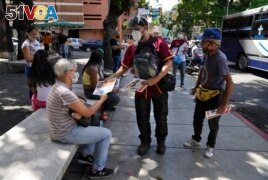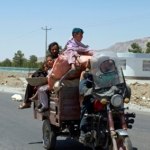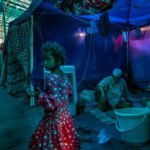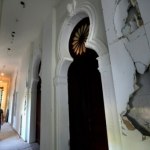10 August 2021
After entering a bus in Venezuela's capital, Juan Pablo Lares sits facing the passengers. He turns on a microphone and speaker, and delivers the news. Someone else holds a black cardboard square around his face to look like he is on a television screen.
He reads the news to the passengers on "El Bus TV," and most listen carefully. Others move past him to get on or off at their stops. The news he delivers rarely makes Venezuela's socialist government appear effective.
That is one of many ways reporters are fighting to keep press freedom in the South American nation. Media in Venezuela, like in other countries, have been struggling to survive.
They face growing pressures from a government trying to control the news. Some members of the media have been fined for criticizing government officials. The government has also placed barriers on purchasing newsprint. This has left millions of people with access to information only through state media.
"This newscast is a way to overcome censorship and misinformation in Venezuela," Lares told his audience of passengers one July afternoon.
Some journalists are giving free newspapers to bus passengers and people at bus stops. Other journalists are walking into communities and reading the news to people standing around them or listening from their windows.
Since President Nicolás Maduro took office in 2013, more than 60 news outlets have closed. Some of them have had multimillion-dollar fines placed by the government telecommunications commission. It accused them of spreading hatred and supporting the weakening of the government.
Maduro says the media is against his government and spreads false information. His actions toward the press are similar to Venezuela's previous president, Hugo Chávez. Chávez called independent media an enemy after taking power in 1999.
A court in May took control of the Caracas headquarters of the newspaper El Nacional. It was often critical of Maduro and his allies. The action was the result of a defamation lawsuit filed by the vice president of the ruling party.
That same month, the newspaper El Tiempo de Anzoátegui, in the country's northeast, stopped printing. It still publishes news online.
Now, residents in 11 of the country's 23 states no longer have access to newspapers from their areas, reports Espacio Público. The group tracks media censorship in Venezuela.

Juan Pablo Lares distributes free copies of a newspaper "Enterate" to people at a bus stop in Caracas, Venezuela, Saturday, July 31, 2021. (AP Photo/Ariana Cubillos)
Daniela Alvarado is with Venezuela's independent Press and Society Institute. She said the use of unusual ways to report the news "has been the positive side of the terrible consequences for journalism in the country, censorship and the precarious conditions that are currently being experienced."
The newspaper La Nación once printed more than 30 pages everyday and won national journalism awards.
But today, the newspaper in the state of Táchira prints less than 15 pages just four times a week. Omaira Labrador is head of the paper. She said they have an online edition, but people prefer to get their news in print.
Last year, Labrador joined with other media outlets. Since December, they have produced a newscast aired by several radio stations. The goal, she said, is to "fulfill the social mission of all media" to keep people informed.
The attempts to weaken the press come as Venezuela faces political, social and economic crises. Driven by dropping oil prices and 20 years of government mismanagement, the country has been in recession for years. Millions live in poverty with high food prices, low wages and high inflation.
"Journalism is used to being the media reporting news on television, radio or the print media," said Maximiliano Bruzual. He is another reporter with El Bus TV. "What we do is get out of the box so to speak."
I'm Dan Novak.
Regina Garcia Cano and Juan Pablo Arraez reported this story for The Associated Press. Dan Novak adapted it for VOA Learning English. Susan Shand was the editor.
____
Words in This Story
overcome — v. to defeat (someone or something)
censor — v. to examine books, movies, letters, etc., in order to remove things that are considered to be offensive, immoral, harmful to society, etc.
journalist — n. the activity or job of collecting, writing, and editing news stories for newspapers, magazines, television, or radio
defamation — n. the act of saying false things in order to make people have a bad opinion of someone or something : the act of defaming someone or something
consequence — n. something that happens as a result of a particular action or set of conditions
precarious — adj. something that happens as a result of a particular action or set of conditions
highlight — v. to make or try to make people notice or be aware of (someone or something) : to direct attention to (someone or something)
(think) out of the box — phr. think in a new or creative way














